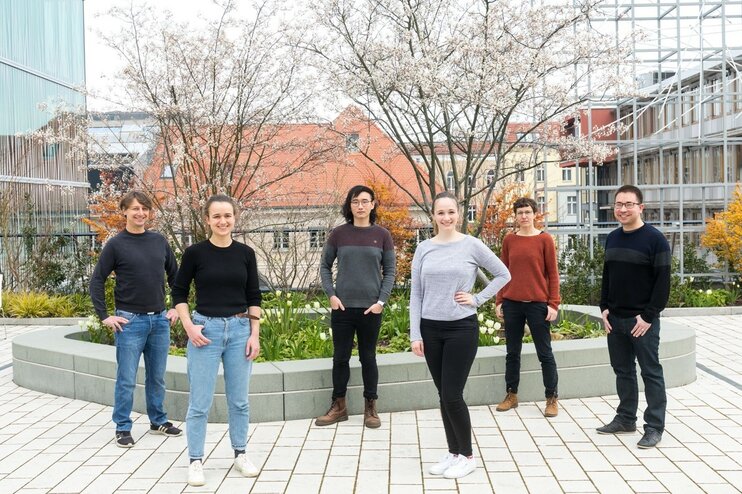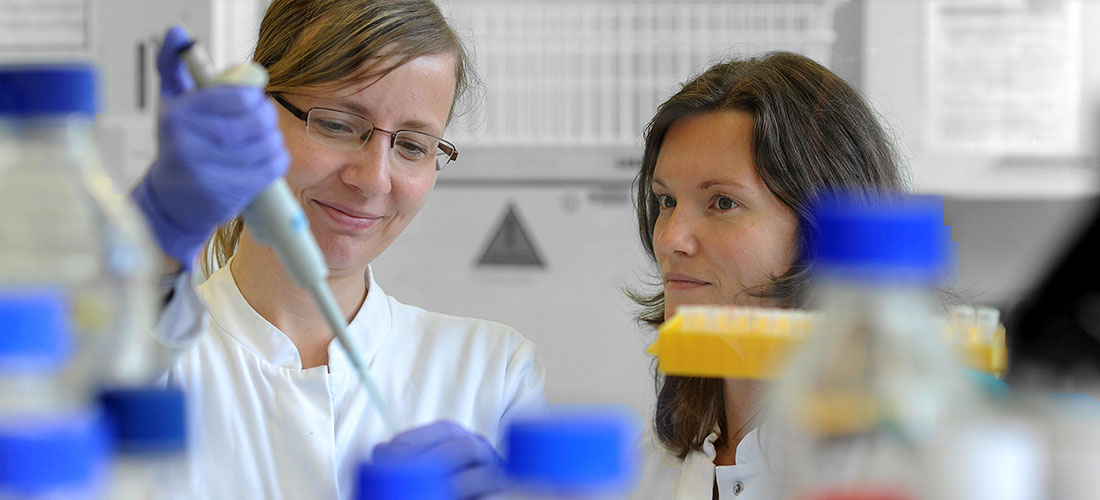Dr. med. Dr. rer. nat. Leif S. Ludwig
Name and Position of Group Members

Dr. Patrick Maschmeyer
Dr. Paulina Strzelecka
Lena Nitsch, PhD candidate
Pauline Kautz, PhD candidate
Yu-Hsin Hsieh, PhD candidate
Klara Penkert, PhD candidate
Janet Liebold, lab manager/technician
Caroline Röthemeier, lab manager/technician
Most important Awards, Grants or Scientific Achievements
- 2021 Hector Fellow Academy Research Career Development Award
- 2020 Emmy-Noether Fellowship awarded by the Deutsche Forschungsgemeinschaft (DFG)
- 2020 BroadIgnite Award by the Broad Institute of MIT and Harvard
- 2018 Seal of Excellence by the European Commission
- 2016 Elisabeth-Gateff Award by the German Genetics Society
- 2016 MINT Excellence Award by the Manfred Lautenschläger foundation
- 2012 PhD Research Fellowship by the German National Academic Foundation
- 2011 MD Research Fellowship by the Boehringer Ingelheim Fonds
- 2008 Best diploma in the program of Biochemistry, Freie Universität Berlin, Germany
Scientific Scope
Our lab currently works on a number of research topics in the areas of single cell genomics, hematology/oncology and mitochondrial genetics & genome biology:
Single-cell multi-omics methods
We have developed a range of single-cell-based technologies that enable the concomitant measurements of multiple modalities from the same cells to maximize the phenotypic depth of information for cellular profiling. For instance, we have combined high-throughput accessible chromatin profiling with whole mitochondrial genome sequencing for clonal tracing and the study of mitochondrial genetics (mitochondrial single-cell ATAC-seq, mtscATAC-seq). We further contributed to enabling the simultaneous profiling of surface marker and intracellular proteins (ATAC with Select Antigen Profiling by sequencing, ASAP-seq). We have integrated gene activity-based readouts from chromatin accessibility, mRNA expression and cellular proteins, thereby allowing to address the central aspects of gene regulation (DOGMA-seq). Together with computational approaches, these methods allow us to comprehensively study human genetics and biomedical questions in health and disease contexts.
Hematopoiesis & hematopoietic stem cell biology
A major focus of the lab is the study of hematopoiesis, a process that gives rise to a diverse repertoire consisting of millions of blood cells every second. Conceivably, this is a highly regulated process that is controlled by hematopoietic stem cell activity in the bone marrow. Recent studies suggests that the hematopoietic stem cell pool is highly heterogenous. By leveraging genomic sequence variation as natural genetic barcodes, we have previously demonstrated the utility of somatic mitochondrial mutations to resolve clonal processes in the human bone marrow at high resolution and scale. By combining single-cell multi-omic technologies with cell biological approaches and insights from clinical observations and human genetics, we aim to uncover fundamental mechanisms of hematopoietic stem cell biology, underlying clonal dynamics and its (dys-)regulation in diseases such as leukemia.
Mitochondrial genetics and genomics
Mitochondria play a central role in metabolism and are unique organelles that carry their own genome, encoding a subset of proteins, tRNAs and ribosomal RNAs essential to their function. Critically, mutations in the mitochondrial genome are associated with a multitude of congenital disorders and clinical phenotypes. Recently, we have shown that single-cell genomic approaches can be effectively used to study such disorders and, more generally, mechanisms of mitochondrial genetics that are characterized by high mitochondrial DNA copy number and unique modes of replication/inheritance. Moreover, we have demonstrated the high prevalence of somatic mitochondrial DNA mutations that may contribute to a series of human phenotypes. Using cell biological, single-cell multi-omics and computational approaches, we aim to advance our understanding of the pleiotropic function of the mitochondrial genome in shaping human and cellular phenotypes.
Selected References
- Mimitou E*, Lareau CA*, Chen KY*, Zorzetto-Fernandes AL, Hao Y, Takeshima Y, Luo W, Huang TS, Yeung BZ, Papalexi E, Thakore PI, Kibayashi T, Wing JB, Hata M, Satija R, Nazor KL, Sakaguchi S^, Ludwig LS^, Sankaran VG^, Regev A^, Smibert P^§. Scalable, multimodal profiling of chromatin accessibility, gene expression, and protein levels in single cells. Nature Biotechnology 2021
- Lareau CA*§, Ludwig LS*§, Muus C, Gohil SH, Zhao T, Chiang Z, Pelka K, Verboon JM, Luo W, Christian E, Rosebrock D, Getz G, Boland GM, Chen F, Buenrostro JD, Hacohen N, Wu CJ, Aryee MJ, Regev A§, Sankaran VG§. Massively parallel single-cell mitochondrial DNA genotyping and chromatin profiling. Nature Biotechnology 2020
- Walker MA*, Lareau CA*, Ludwig LS*, Karaa A, Sankaran VG§, Regev A§, Mootha VK§. et al. Purifying selection against pathogenic mitochondrial DNA in T cells. New England Journal of Medicine 2020
- Ludwig LS*§, Lareau CA*, Ulirsch JC*, Christian E, Muus C, Li LH, Pelka K, Ge W, Oren Y, Brack A, Law T, Rodman C, Chen JH, Boland GM, Hacohen N, Rozenblatt-Rosen O, Aryee MJ, Buenrostro JD, Regev A§, Sankaran VG§. Lineage tracing in humans enabled by mitochondrial mutations and single cell genomics. Cell 2019
- Ludwig LS, Gazda HT, Eng JC, Eichhorn SW, Thiru P, Ghazvinian R, George TI, Gotlib JR, Beggs AH, Sieff CA, Lodish HF, Lander ES, Sankaran VG. Altered translation of GATA1 in Diamond-Blackfan anemia. Nature Medicine 2014
*equal contribution §corresponding author ^co-senior author




